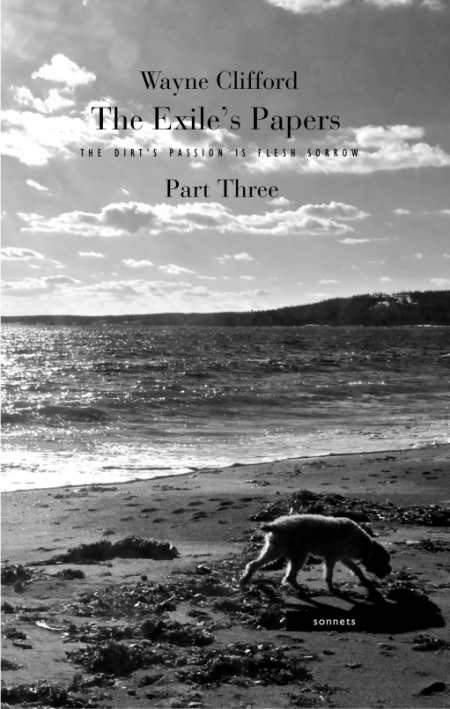The Exile's Papers
The Dirt's Passion Is Flesh Sorrow
How many variations can one person find in the sonnet, the poetic form made famous by Petrarch, Spenser, and Shakespeare for their particular tailoring of it to suit their designs? The Canadian poet Wayne Clifford has added himself to history’s long list of those obsessed with the versatility of the sonnet, and his latest 156 pages of sonnets prove that it is an obsession that may be difficult to get to the bottom of. The Dirt’s Passion Is Flesh Sorrow is part three of Wayne Clifford’s four-part sonnet collection, The Exile’s Papers. The previous books, The Exile’s Papers: The Duplicity of Autobiography and The Exile’s Papers: The Face as Its Thousand Ships, were published in 2007 and 2009 respectively.
Clifford’s sonnets sometimes resemble the compact fourteen-line “little song” that readers of poetry have come to know. But more often, they surprise for the way that they—in ultimate homage to the words of the poem—take the shape that the words and sound dictate. And the surprise does not stop there. Clifford is rambunctious in his sonneteering of anything and everything on his mind, from George W. Bush and the financial crisis (equated to cowboys in the Wild West) to Wallace Stevens, dogs, and prank phone calls, among many other subjects.
Often cynical and irreverent, Clifford’s language soars with unexpected twists and turns, often taking readers on jaunts through extended metaphor. In “The Exile Meets Dante,” Clifford writes about Bush’s plans for the Taliban: “The National Debt justify its grand / hot-doggedness? Its half-cooked plan, / akin to TV football, save the land?” In “A Country Drive,” a more emotional poem where the speaker recalls the difficulty of his mother’s life, Clifford makes descriptive combinations that sear with their accuracy. “Ah, Dublin! How I wish I had a tale / so freighted with cat-lick poverty / that I could brag a snot-green sea….”
From poem to poem in this collection, readers cannot predict from which direction a wave might hit them, for the transitions from subject to subject are naturally seamless. Similarly, the emotional weight of the poems is easily counterbalanced from line to line, from witty to serious to disgusted and sometimes resigned. No matter where readers are when they pick up the collection, they will be firmly transplanted into Wayne Clifford’s mind, meeting him precisely where he is in his thoughts.
Readers fascinated by form with a penchant for playful language and occasional surrealness would be a natural fit for The Dirt’s Passion Is Flesh Sorrow or any of the other books in this collection. Additionally, present and future readers at libraries would find it a boon to happen upon the latest of Wayne Clifford’s work in the stacks.
Reviewed by
Jennifer Fandel
Disclosure: This article is not an endorsement, but a review. The publisher of this book provided free copies of the book and paid a small fee to have their book reviewed by a professional reviewer. Foreword Reviews and Clarion Reviews make no guarantee that the publisher will receive a positive review. Foreword Magazine, Inc. is disclosing this in accordance with the Federal Trade Commission’s 16 CFR, Part 255.

